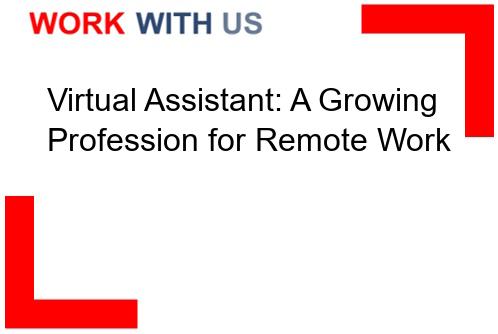In today’s fast-paced and technologically advanced world, the concept of remote work has gained immense popularity. As more and more individuals seek flexible work arrangements, the demand for virtual assistants has skyrocketed. The profession of a virtual assistant has emerged as a promising career option, offering individuals the opportunity to work remotely and provide valuable support to businesses and entrepreneurs.
A virtual assistant, often referred to as a VA, is a professional who provides administrative, technical, or creative assistance to clients from a remote location. They leverage various communication tools and technology to collaborate with their clients and complete tasks efficiently. From managing emails and scheduling appointments to conducting research and social media management, virtual assistants offer a wide range of services tailored to meet the specific needs of their clients.
One of the key advantages of being a virtual assistant is the flexibility it offers. Unlike traditional office jobs, virtual assistants have the freedom to work from anywhere in the world, as long as they have a reliable internet connection. This flexibility allows individuals to create a work-life balance that suits their needs, whether it’s working from the comfort of their own home or while traveling the globe. Additionally, virtual assistants have the ability to choose their own working hours, making it an ideal profession for those who value autonomy and independence.
The growing popularity of remote work has contributed to the increasing demand for virtual assistants. Many businesses, especially startups and small enterprises, are turning to virtual assistants as a cost-effective solution to their administrative needs. By hiring a virtual assistant, businesses can save on office space, equipment, and other overhead expenses associated with hiring an in-house employee. Moreover, virtual assistants often work on a freelance or contract basis, allowing businesses to scale their support as needed without the commitment of a full-time employee.
The skills required to excel as a virtual assistant are diverse and adaptable. Strong organizational and time management skills are essential, as virtual assistants often juggle multiple tasks and deadlines simultaneously. Excellent communication skills, both written and verbal, are crucial for effective collaboration with clients and colleagues. Proficiency in various software applications and online tools, such as project management systems and video conferencing platforms, is also highly valued in this profession.
As the demand for virtual assistants continues to grow, so does the potential for career advancement. Virtual assistants can specialize in specific industries or services, such as social media management, content creation, or bookkeeping, to enhance their expertise and attract niche clients. Additionally, some virtual assistants choose to expand their skill set by taking courses or obtaining certifications in areas such as digital marketing or graphic design, further increasing their marketability.
In conclusion, the profession of a virtual assistant has emerged as a thriving career option in the realm of remote work. With its flexibility, diverse skill requirements, and increasing demand, virtual assisting offers individuals the opportunity to work remotely while providing valuable support to businesses and entrepreneurs. As technology continues to advance and remote work becomes more prevalent, the role of virtual assistants is expected to grow even further, making it an exciting and promising profession for those seeking a flexible and fulfilling career.
The role of virtual assistants in enhancing productivity and efficiency in remote work environments
The advent of remote work has revolutionized the way people work, allowing individuals to work from the comfort of their own homes or any location of their choice. However, with this newfound flexibility comes the challenge of maintaining productivity and efficiency. This is where virtual assistants play a crucial role in enhancing productivity and efficiency in remote work environments.
Virtual assistants, also known as AI-powered digital assistants, are software applications that can perform various tasks and provide support to individuals remotely. These assistants are designed to mimic human interactions and can perform a wide range of tasks, including scheduling appointments, managing emails, organizing files, and even conducting research.
One of the key ways virtual assistants enhance productivity in remote work environments is by automating repetitive tasks. In a traditional office setting, employees often spend a significant amount of time on mundane tasks such as data entry or scheduling meetings. By delegating these tasks to virtual assistants, remote workers can focus on more important and strategic aspects of their work, ultimately increasing their productivity.
Moreover, virtual assistants can help remote workers stay organized and manage their time effectively. With the ability to set reminders, create to-do lists, and prioritize tasks, virtual assistants ensure that remote workers stay on track and meet their deadlines. This not only enhances productivity but also reduces the chances of important tasks being overlooked or forgotten.
In addition to task management, virtual assistants can also assist remote workers in accessing and organizing information. With the vast amount of data available online, it can be overwhelming for remote workers to find relevant information quickly. Virtual assistants can help by conducting research, summarizing articles, and providing relevant information on demand. This saves remote workers valuable time and allows them to make informed decisions efficiently.
Furthermore, virtual assistants can facilitate effective communication and collaboration in remote work environments. With the rise of remote teams, it is crucial to have seamless communication channels to ensure efficient collaboration. Virtual assistants can help by scheduling and organizing virtual meetings, sending reminders, and even transcribing meeting notes. This streamlines the communication process and ensures that remote teams stay connected and productive.
Another significant advantage of virtual assistants in remote work environments is their ability to provide personalized support. These assistants can learn and adapt to individual preferences and work styles, making them highly efficient in assisting remote workers. Whether it’s customizing email templates or providing tailored recommendations, virtual assistants can cater to the specific needs of each remote worker, ultimately enhancing their productivity and efficiency.
Moreover, virtual assistants can also contribute to work-life balance in remote work environments. With the flexibility of remote work, it can be challenging for individuals to maintain a healthy work-life balance. Virtual assistants can help by setting boundaries, reminding remote workers to take breaks, and even suggesting activities to promote well-being. By promoting work-life balance, virtual assistants contribute to overall productivity and job satisfaction in remote work environments.
In conclusion, virtual assistants play a vital role in enhancing productivity and efficiency in remote work environments. By automating repetitive tasks, managing time effectively, organizing information, facilitating communication, providing personalized support, and promoting work-life balance, virtual assistants empower remote workers to focus on high-value tasks and achieve their goals. As remote work continues to grow in popularity, the role of virtual assistants will only become more significant in optimizing productivity and efficiency in remote work environments.
Exploring the benefits and challenges of hiring virtual assistants for remote work
In today’s digital age, the concept of remote work has gained significant traction, and with it, the demand for virtual assistants has soared. A virtual assistant is a professional who provides administrative, technical, or creative support remotely, allowing businesses to streamline their operations and focus on core tasks. While there are numerous benefits to hiring virtual assistants, there are also challenges that need to be considered.
Benefits of Hiring Virtual Assistants
Increased Productivity: Virtual assistants can handle time-consuming tasks, such as data entry, scheduling, and email management, which frees up valuable time for business owners and employees. By delegating these responsibilities, productivity levels can soar, enabling individuals to focus on high-priority projects and strategic decision-making.
Cost Savings: Hiring virtual assistants can be a cost-effective solution for businesses. Unlike traditional employees, virtual assistants are typically hired on a contract or freelance basis, eliminating the need for additional expenses such as office space, equipment, and benefits. This flexibility allows businesses to scale their workforce up or down as needed, without incurring unnecessary costs.
Access to Diverse Skill Sets: Virtual assistants often possess a wide range of skills and expertise, making them versatile assets to any organization. Whether it’s graphic design, social media management, or customer support, virtual assistants can bring specialized knowledge to the table, enhancing the overall capabilities of a business.
Flexibility and Global Reach: Virtual assistants can work from anywhere in the world, providing businesses with access to a global talent pool. This flexibility allows organizations to tap into different time zones, ensuring round-the-clock support and increased responsiveness to customer needs. Additionally, virtual assistants can adapt to changing workloads and deadlines, providing businesses with the agility they need to thrive in a fast-paced environment.
Challenges of Hiring Virtual Assistants
Communication and Collaboration: One of the primary challenges of working with virtual assistants is establishing effective communication channels. Without face-to-face interaction, it can be more difficult to convey expectations, provide feedback, and build rapport. Employers must invest time in setting clear guidelines, utilizing project management tools, and scheduling regular check-ins to ensure seamless collaboration.
Trust and Reliability: Trust is crucial when working with virtual assistants, as they are responsible for handling sensitive information and representing the business. Employers must carefully vet potential candidates, checking references and conducting thorough background checks. Building a strong working relationship based on trust and reliability is essential for long-term success.
Time Zone Differences: While the global reach of virtual assistants is advantageous, it can also pose challenges. Depending on the location of the virtual assistant, significant time zone differences may exist, making real-time collaboration difficult. Employers must carefully consider these differences and establish clear expectations regarding availability and response times.
Maintaining Company Culture: Virtual assistants may not have the same level of immersion in a company’s culture as traditional employees. This can make it challenging to align their work with the organization’s values and goals. Employers should make an effort to integrate virtual assistants into the company culture through regular communication, virtual team-building activities, and inclusion in company-wide initiatives.
Data Security and Confidentiality: With remote work comes the need for robust data security measures. Employers must ensure that virtual assistants adhere to strict confidentiality agreements and implement secure communication and file-sharing platforms. Regular audits and training on data protection best practices are essential to safeguard sensitive information.
The Future of Virtual Assistants
As technology continues to advance, the role of virtual assistants is expected to evolve. Artificial intelligence and machine learning are already being integrated into virtual assistant platforms, enabling them to handle more complex tasks and provide personalized experiences. The future may see virtual assistants becoming even more autonomous, with the ability to learn and adapt to individual preferences and work styles.
Furthermore, the demand for virtual assistants is likely to increase as businesses recognize the benefits of remote work and the need for flexible staffing solutions. This trend is particularly evident in the wake of the COVID-19 pandemic, which has accelerated the adoption of remote work practices.
In conclusion, hiring virtual assistants for remote work offers numerous benefits, including increased productivity, cost savings, access to diverse skill sets, and global reach. However, challenges such as communication, trust, time zone differences, maintaining company culture, and data security must be carefully addressed. By understanding and mitigating these challenges, businesses can harness the full potential of virtual assistants and drive their success in the digital era.
The evolving skillset of virtual assistants: adapting to the changing landscape of remote work
The role of virtual assistants has undergone a significant transformation in recent years, as they adapt to the changing landscape of remote work. With advancements in technology and the increasing demand for flexible work arrangements, virtual assistants have had to evolve their skillset to meet the evolving needs of their clients.
One of the key skills that virtual assistants have had to develop is effective communication. As remote work becomes more prevalent, virtual assistants are often the main point of contact for clients and colleagues. They must be able to communicate clearly and concisely through various channels, such as email, instant messaging, and video conferencing. This requires strong written and verbal communication skills, as well as the ability to adapt their communication style to different audiences.
In addition to communication skills, virtual assistants must also possess excellent organizational abilities. With the absence of physical proximity, virtual assistants need to be highly organized to manage their own tasks and deadlines effectively. They must be able to prioritize tasks, set realistic goals, and manage their time efficiently. This skill is crucial in ensuring that they can meet the demands of their clients and deliver high-quality work in a timely manner.
Another important skill that virtual assistants must possess is adaptability. The remote work landscape is constantly evolving, and virtual assistants need to be able to adapt to new technologies and tools. They must be willing to learn and embrace new software and platforms that can enhance their productivity and efficiency. This adaptability also extends to their ability to work with different clients and industries, as each client may have unique requirements and expectations.
Problem-solving skills are also essential for virtual assistants. As they work remotely, they often encounter challenges and obstacles that require quick thinking and creative solutions. Whether it’s troubleshooting technical issues or finding alternative ways to complete a task, virtual assistants must be resourceful and proactive in finding solutions. This skill not only helps them overcome obstacles but also adds value to their clients by providing innovative solutions to problems.
Furthermore, virtual assistants must possess a high level of self-motivation and discipline. Working remotely requires a great deal of self-discipline, as there are often no set working hours or a physical office environment to provide structure. Virtual assistants must be able to manage their time effectively, stay focused on their tasks, and meet deadlines without constant supervision. This self-motivation is crucial in maintaining productivity and delivering results in a remote work setting.
Lastly, virtual assistants must continuously update their skills and stay abreast of industry trends. The remote work landscape is constantly evolving, and virtual assistants need to stay ahead of the curve to remain competitive. This may involve taking online courses, attending webinars, or participating in professional development programs. By continuously updating their skills, virtual assistants can ensure that they are equipped with the latest tools and techniques to provide exceptional support to their clients.
In conclusion, the skillset of virtual assistants has evolved significantly to adapt to the changing landscape of remote work. Effective communication, organizational abilities, adaptability, problem-solving skills, self-motivation, and continuous learning are all essential skills for virtual assistants in today’s remote work environment. By honing these skills, virtual assistants can thrive in their roles and provide valuable support to their clients, regardless of their location.
Virtual assistants: bridging the gap between employers and remote workers
Virtual assistants have become an integral part of the modern workforce, bridging the gap between employers and remote workers. These digital helpers provide a wide range of services, from administrative tasks to customer support, allowing businesses to streamline their operations and maximize productivity. With advancements in technology and the rise of remote work, virtual assistants have gained popularity and are now an essential component of many organizations.
The Role of Virtual Assistants
Virtual assistants play a crucial role in supporting employers and remote workers alike. They handle various administrative tasks such as managing emails, scheduling appointments, and organizing documents. By taking care of these time-consuming responsibilities, virtual assistants free up valuable time for employers and remote workers to focus on more important tasks, ultimately increasing efficiency and productivity.
Moreover, virtual assistants can also provide customer support, responding to inquiries and resolving issues on behalf of the employer. This not only ensures that customers receive prompt assistance but also allows businesses to maintain a professional image and provide excellent customer service.
Benefits of Virtual Assistants
The benefits of virtual assistants extend beyond just administrative support. One of the key advantages is the flexibility they offer. Employers can hire virtual assistants on an as-needed basis, avoiding the costs associated with hiring full-time employees. This flexibility allows businesses to scale their operations up or down based on demand, without the need for long-term commitments.
Additionally, virtual assistants can work remotely, eliminating the need for physical office space and reducing overhead costs. This is particularly beneficial for startups and small businesses with limited resources. By leveraging virtual assistants, these organizations can access top talent from around the world without the constraints of geographical boundaries.
Challenges and Solutions
While virtual assistants offer numerous benefits, there are also challenges that employers and remote workers may face. Communication and coordination can be more challenging when working with a virtual assistant, as they are not physically present in the same location. However, advancements in communication technology have made it easier to bridge this gap. Video conferencing, instant messaging, and project management tools enable seamless collaboration and ensure that everyone is on the same page.
Another challenge is ensuring data security and confidentiality when working with virtual assistants. Employers must establish clear guidelines and protocols to protect sensitive information. This can include using secure file-sharing platforms, implementing data encryption measures, and signing non-disclosure agreements with virtual assistants.
The Future of Virtual Assistants
As technology continues to advance, the role of virtual assistants is expected to evolve. Artificial intelligence (AI) and machine learning are already being integrated into virtual assistant platforms, enabling them to learn and adapt to specific tasks and preferences. This will further enhance their ability to provide personalized and efficient support.
Moreover, the increasing popularity of voice-activated virtual assistants, such as Amazon’s Alexa and Apple’s Siri, indicates a shift towards more natural and intuitive interactions. These voice assistants are becoming more sophisticated, capable of understanding complex commands and performing a wide range of tasks. As they become more integrated into our daily lives, the demand for virtual assistants in the workplace is likely to increase.
Virtual assistants have revolutionized the way employers and remote workers collaborate. By taking care of administrative tasks and providing support, they enable businesses to operate more efficiently and effectively. The flexibility, cost savings, and advancements in technology make virtual assistants an invaluable asset for organizations of all sizes. As the future unfolds, virtual assistants will continue to bridge the gap between employers and remote workers, shaping the way we work and interact in the digital age.



